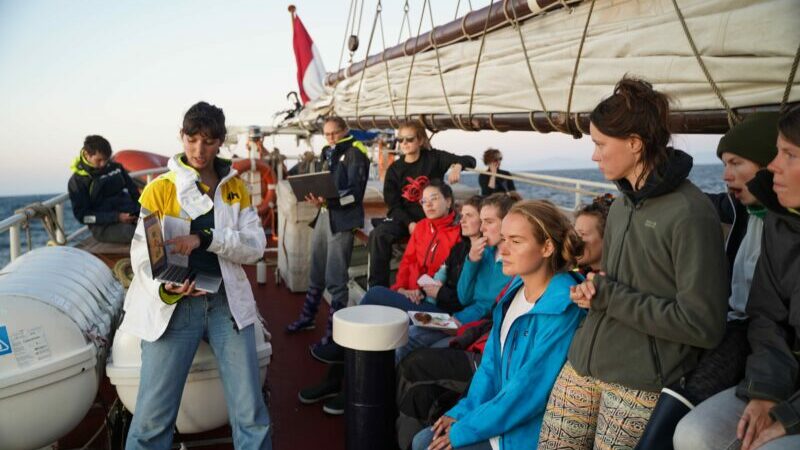When the news came, I was in the middle of the Atlantic Ocean, heading to Santiago de Chile for the 25th UN climate conference, the Cop.
Our crew of European students, young professionals and climate activists had traveled some 4,000 miles from the Netherlands aboard the Regina Maris sailing ship. We were on a journey that we had carefully planned to highlight the environmental and social costs of Europe’s travel industry.
But on October 30th, 2019, after a month at sea, our plans crumbled when Chile withdrew as host of the summit. By the time we learned that the event would be moved to Madrid, we knew we could not sail back there in time.
That abrupt crisis compelled us to rethink how to achieve our goals: to alert, inform and spark change on the impact of aviation on our planet.
Insights from my personal experiences on that ocean journey nearly two years ago have parallels with my work now with another crew – this time, with a team of researchers examining how to rethink the climate negotiation processes in ways that can deliver, particularly for people who are, in effect, stranded outside the process.
Shell ordered to slash emissions 45% by 2030 in historic court ruling
The Covid-19 pandemic has thrust climate diplomacy into a crisis that means well-laid plans are no longer viable. We must rethink processes and explore ways to use online technology to make the Cop sessions work, to become more inclusive of civil society – not just for these pandemic-scarred times, but for the long haul. Work that my colleagues and I are doing through the Stockholm Environment Institute’s Online Climate Negotiations project suggests that this is possible, but only under certain conditions.
Success of the Paris Agreement depends on gaining the trust of people like you and me. I have trained young people to engage with climate negotiations, and I have observed new and growing levels of frustration and anger from civil society whose messages are ignored. Countries must understand that their citizens are the fiercest advocates of ambition and action.
These times of change offer a unique opportunity to let citizens play that important role within the UN’s digital negotiating halls. Sadly, at the ongoing June climate conference, a test for future online activities, some parties are cultivating mistrust. It says something when observers are asked to leave negotiations on the subject of transparency.
Aboard the Regina Maris, when the word from Chile came, we knew our original plans were no longer viable, and so we adapted. We carried on in a new way – more determined than ever to get our message across and to hold our decision makers accountable for their inaction.
We sailed on, landing on the Caribbean coast. All the while, we broadcast news of our predicament through our social media channels. We asked others to help us, wherever they were. People responded. We recruited many more young people in Europe who were willing to join our fight and carry our message to Madrid in person and through online channels.

Inès Bakhtaoui is interviewed by local press at the ship’s first stop in Casablanca (Photo: Jeppe Bijker/Sail to the COP)
Our outreach prompted others to hand out our specific proposals to members of the European Parliament in person. Some recent efforts in Europe to boost train travel over flying show that our mission is beginning to gain traction.
If anything, by using technology, my voice was that much louder. I recognize that my story was only possible because I have so many privileges of education, financial stability, and digital access. I know that switching to online media may still exclude many.
But the experience has made me realize that virtual tools are powerful, and their use should be spread – deliberately and massively – to popularize the content of the conversation held at Cop sessions, and to make them as accessible as possible. Anyone should be able to be part of these important discussions, to engage in what will inevitably be a long, tumultuous journey towards climate accountability.
Inès Bakhtaoui is a research associate with the Oxford Centre of the Stockholm Environment Institute.
